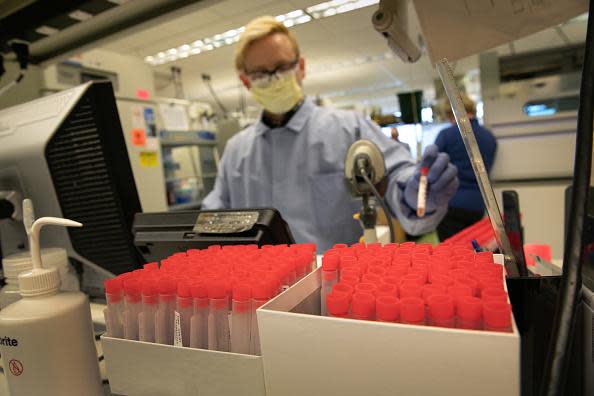Climate change helped coronavirus spread — and your AC means it probably won't die in summer

Environmental factors play a critical role in enabling the spread of infectious diseases like Covid-19. President Trump, amongst others, claim warmer summer months may slow down the pandemic. However, though preliminary findings suggest the outbreak may be seasonal, the World Health Organisation argues there is “no reason to believe that this virus would behave differently in different temperatures”. Studies from previous outbreaks speculate that the prolific use of air conditioning would permit pathogens to spread throughout the summer months.
The data for Covid-19 may be incomplete but research on other strains, such as SARS, demonstrates significant influence of environmental factors. With SARS, scientists concluded optimal temperatures of 22 to 25°C and relative humidity of 40 to 50 per cent but a rapid decline in virus survival in temperatures above 38°C and humidity of above 95 per cent.
The impact of climate change on ecosystems will affect the behaviour of viruses, augmenting their capability to infect communities worldwide. Further, as environmental conditions impact pathogen behaviours, climate change threatens to significantly disrupt the transmission of infectious diseases.
On a local level, flooding caused by sea-level rise or heavy rains will facilitate the spread of water-borne illnesses, while hurricanes and other extreme weather events could help enable the spread of airborne pathogens such as new strains of the flu. On a global level, melting sea ice and glaciers are thawing and releasing ancient, frozen viruses and bacteria, as well as helping arctic pathogens contaminate new areas. Researchers from the University of California Davis and St Andrews University in Scotland have been tracking the spread of Phocine Distemper virus, which has now spread from marine animals in the North Atlantic to populations in the North Pacific.
Furthermore, climate change is enabling vector-borne diseases, or illnesses transmitted via intermediaries such as insects or rodents. Stanford University research has highlighted how global warming is allowing disease-bearing mosquito species to spread in new previously unreachable geographies, infecting unprepared local communities.
In response to the growing risk of global disease outbreak, and indeed other possible by-products of a swiftly changing environment, a drastic systemic shift in public health innovation is required. Though governments may be working well under pressure, the lack of adequate contingency planning and ineffective resource allocation has left nations dependent on ad-hoc measures, which are coming at a great socioeconomic cost.
Covid-19 isn’t the first virus to have threatened civilization. Political tensions in the aftermath of the First World War prevented an international effort to contain the Spanish flu. In the absence of effective intergovernmental cooperation and communication, the Spanish flu claimed 50 to 100 million lives between 1918 and 1920, which would have been 27 per cent of the global population at the time. The First World War, as a point of reference, has an estimated direct death toll of 16 million, up to 84 million less than the Spanish flu. State leaders who, up until now, have insisted on flooding most tax resources to the military may have realised that there are deadlier threats on the planet than other nations.
Current politicians may be on uncommon ground, yet a paradigm has been shifting within the scientific community since the SARS outbreak. The urgency of the epidemic motivated a network of 84 scientists from 13 laboratories all over the world to put aside profit and prestige to find causes and methods of combating SARS. In April 2003, Executive Director of Communicable Diseases for the WHO, Dr David Heymann, stated, “The pace of SARS research has been astounding. Because of extraordinary collaboration among laboratories from countries around the world, we now know with certainty what causes SARS.” The global response was the first of its kind: global, collaborative and conducted with unprecedented speed.
The response to Covid-19 has followed in the footsteps of the SARS virologists. Dissemination of data has been almost immediate using preprint servers; analysis has been quick to follow through other digital channels; most literature has been received by the relevant parties even before formal peer review. As of March 17th, there are 1,660 documents pertaining to the disease on Google Scholar. According to Harvard epidemiologist Marc Lipsitch, the intense communication and collaboration has catalysed faster advances in research than any previous outbreak. Even journalists are collaborating, to ensure the public has all the information they require to protect themselves and others, as well as to combat possibly deadly misinformation and disinformation.
It is becoming increasingly evident that there is an imminent need to focus on developing novel, digitally enabled processes for augmenting international multidisciplinary collaboration. For this reason, startups worldwide, such as SynSapien, are emerging with novel collaboration processes that equip scientists with the right tools to communicate, analyse, ideate, discuss, critique, design and decide collectively. It is difficult to be prepared for the unforeseeable, and effective collaboration tools are paramount to our ability to adapt to our ever-changing environment.
Manolya Adan is a biologist and Basil Mahfouz is an international policy specialist. They are co-founders of SynSapien, a platform for scientific collaboration

 Yahoo News
Yahoo News 
